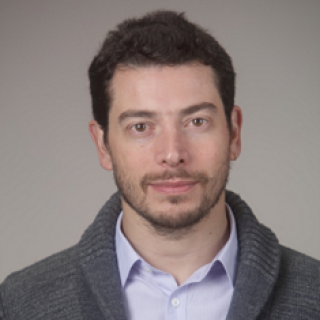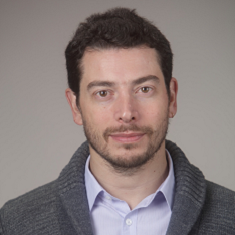
Julián Candia, Ph.D.
- Center for Cancer Research
- National Cancer Institute
- Bayview Research Center, Room 05B113A
- Baltimore, MD 21224
- julian.candia@nih.gov
RESEARCH SUMMARY
Dr. Candia's research interests are focused on the development and application of analysis tools to provide new insight into biological processes relevant to human health. In particular, the availability of high-throughput, multiparametric datasets presents unique opportunities--and challenges--for the development of novel cross-disciplinary tools and frameworks. In this context, his goal is to apply his expertise at the crossroads of bioinformatics, machine learning, network science, and statistical physics to contribute innovative ideas to key problems in biomedical research.
Dr. Candia is currently a Staff Scientist at the Longitudinal Studies Section of the Translational Gerontology Branch at the National Institute on Aging (Baltimore, MD). Previously, he was part of a CCR basic/translational research program aimed at uncovering the molecular underpinnings of liver carcinogenesis and their clinical applications towards personalized cancer medicine.
Areas of Expertise

Julián Candia, Ph.D.
Biography

Julián Candia, Ph.D.
Dr. Candia obtained his "Licenciado" (1999) and Ph.D. in Physics (2004) degrees from the University of La Plata (Argentina). He earned the 2000 “Dr. Joaquín V. González” award for highest GPA. In subsequent years, he worked on a variety of problems involving computational and mathematical modeling of far-from-equilibrium dynamical systems, as well as on data mining and machine learning. In 2009-2011, he worked for the electronic health record software company Epic Systems. In 2011-2014, he joined the University of Maryland with a joint appointment between the Department of Physics (Losert lab) and the School of Medicine (Civin lab), where he was a recipient of an NIH T32 Cancer Biology Training Grant. Since 2014, he works as Staff Scientist at the National Institutes of Health, where he collaborates with basic, translational, and clinical scientists to develop quantitative methods of data analysis to better leverage state-of-the-art technologies in the biomedical realm.
He authored over 90 original research peer-reviewed articles in top scientific journals (including Cell, Immunity, Nature Comm, Science Adv, J Hepatol, J Clin Invest, Biomaterials, Aging Cell, eLife, Sci Rep, PLOS Comp Biol, BMC Bioinformatics, Phys Rev Lett) and 2 book chapters. He serves in the Editorial Boards of Scientific Reports (Nature Portfolio) and Clinical and Experimental Medicine (Springer Nature), as well as a reviewer for multiple journals. Since 2021, he also serves in the NIH Stadtman Search as a member of the Subcommittee for Computational Biology, Bioinformatics, Biostatistics and Mathematics.